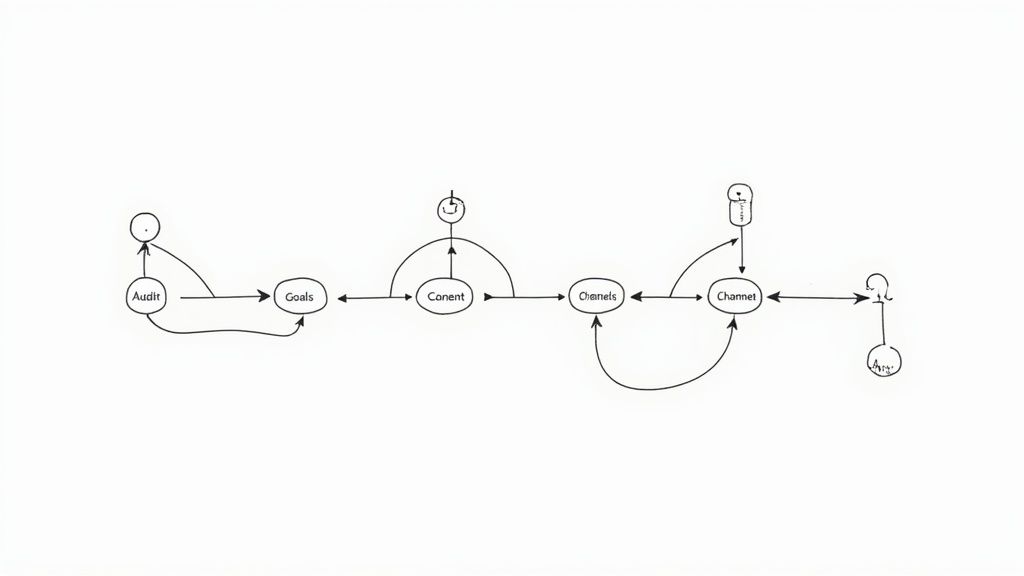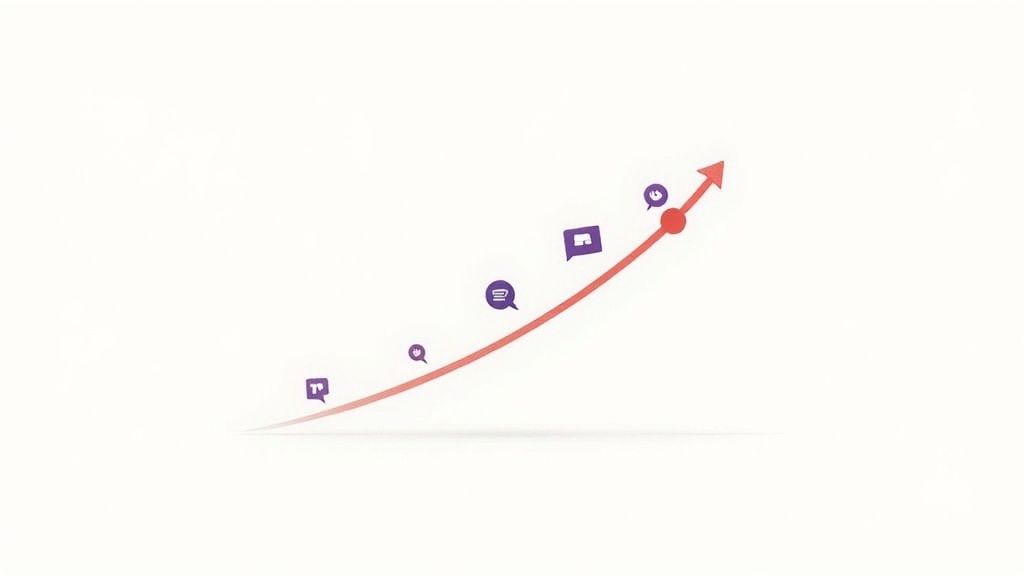
Top Social Media Manager Interview Questions & Tips
Published
Land Your Dream Social Media Role
This listicle provides the top seven social media manager interview questions and strategies for answering them effectively. Understanding these key concepts is crucial for showcasing your expertise and landing your ideal role. We'll cover questions about your experience, staying current with trends, developing strategies, measuring success, handling crises, content creation, and community management. Preparing for these social media manager interview questions will give you a significant advantage in the hiring process.
1. Can you walk us through your experience managing social media for brands?
This is arguably one of the most crucial social media manager interview questions. It's a foundational inquiry that allows you to showcase your professional background and expertise in social media management. By asking this open-ended question, interviewers are looking to assess the depth and breadth of your practical experience, understand your career progression, and uncover any platform specializations you might have. They want to hear about your experience with different platforms, the variety of industries you’ve worked in, and the types of campaigns you’ve managed. This question is also an excellent way for the interviewer to evaluate your communication style and your ability to synthesize career information concisely and effectively.

This question deserves its place at the top of the list of common social media manager interview questions because it provides a comprehensive overview of your capabilities. Its open-ended nature allows you to steer the conversation toward your strongest areas, highlighting relevant accomplishments and demonstrating your value. For example, you can discuss how you’ve adapted to platform algorithm changes or mention specific social media management tools you’ve mastered, such as Hootsuite, Buffer, or Sprout Social. You can learn more about Can you walk us through your experience managing social media for brands? to further understand the expectations surrounding this key question.
Pros:
- Allows candidates to highlight their strongest experiences: You can control the narrative and focus on the aspects of your career that best align with the job description.
- Reveals communication style and ability to synthesize career information: How you structure your answer speaks volumes about your organizational skills and ability to communicate complex information clearly.
Cons:
- Can be difficult to evaluate without specific metrics or verifiable results: Generic answers lacking quantifiable data can make it hard for interviewers to assess your impact.
- May disadvantage candidates with non-traditional career paths: Those with less conventional backgrounds might find it challenging to frame their experience in a way that directly relates to traditional social media management roles.
Examples:
- Strong answer: "At Company X, I managed a complete social rebrand, increasing Twitter engagement by 78% and growing our Instagram following from 5K to 50K in 12 months through targeted content strategies. I also implemented a new social listening strategy using Sprout Social which allowed us to identify and respond to customer concerns more effectively, leading to a 15% improvement in customer satisfaction."
- Weak answer: "I've posted regularly on Facebook and Instagram for several companies."
Tips for Answering:
- Structure your answer chronologically or by platform expertise: This provides a clear and logical flow to your response.
- Quantify results whenever possible: Use metrics to demonstrate the impact of your work (e.g., "Increased Instagram engagement by 45%," "Generated X leads through Facebook advertising").
- Highlight experience relevant to the hiring company's industry: Tailor your answer to the specific needs and challenges of the company you're interviewing with.
- Mention specific tools you've mastered (Hootsuite, Buffer, Sprout Social, etc.): This demonstrates your technical proficiency.
- Explain how you've adapted to platform algorithm changes: Show that you stay up-to-date with the ever-evolving social media landscape.
2. How do you stay current with social media trends and algorithm changes?
This is a crucial social media manager interview question because it assesses a candidate's commitment to continuous learning and adaptability. The ever-shifting landscape of social media demands professionals who are proactive, not reactive. This question probes how candidates maintain current knowledge and anticipate platform changes that could impact content strategy, ultimately revealing their ability to thrive in a dynamic environment. It's a key indicator of whether they're genuinely passionate about the field and possess the forward-thinking abilities essential for effective strategy development.

This question tests a candidate's industry awareness, evaluates their learning habits and preferred resources, and distinguishes between proactive and reactive tendencies. Identifying candidates who are invested in staying ahead of the curve is critical for any organization looking to maximize its social media presence. Learn more about How do you stay current with social media trends and algorithm changes? While experience is valuable, the ability to adapt and evolve is equally important. Staying up-to-date with the latest trends also includes understanding the optimal posting times for maximum visibility and engagement. For insights into this crucial aspect, check out this resource on the best time to post on social media from Galaxyz.
Pros of asking this social media manager interview question:
- Identifies candidates genuinely passionate about social media.
- Reveals forward-thinking abilities essential for strategy development.
Cons of asking this question:
- May favor candidates with more free time for professional development.
- Could disadvantage experienced candidates who rely more on established expertise than trending topics.
Examples of strong and weak answers:
Strong Answer: "I subscribe to Social Media Examiner and Later's newsletters, participate in Meta's Beta testing program, and attend monthly digital marketing webinars. When Instagram shifted toward Reels, I immediately developed a testing protocol that increased our reach by 32% while competitors were still adjusting." This response demonstrates proactive engagement, specific resource utilization, and a data-driven approach to adapting to platform changes.
Weak Answer: "I follow some social media blogs and try to keep up with changes as they happen." This answer is vague, lacks demonstrable action, and suggests a reactive rather than proactive approach.
Tips for answering this social media manager interview question effectively:
- Be Specific: Mention specific newsletters (e.g., Social Media Examiner, Later), podcasts, industry experts, or communities you follow. Name-dropping relevant resources showcases your commitment to continuous learning.
- Showcase Adaptability: Explain how you've successfully navigated a major algorithm change or platform update in the past. Quantify your results whenever possible.
- Demonstrate Proactiveness: Discuss your method for testing new features on platforms and share how you filter signal from noise in the constant influx of industry news.
- Highlight Innovation: Share examples of how you've implemented a cutting-edge trend before competitors, demonstrating your forward-thinking approach.
This question is essential in any social media manager interview because it helps identify candidates who are not only knowledgeable about current trends but also possess the adaptability and proactive mindset necessary to succeed in this dynamic field. It separates those who simply react to changes from those who anticipate and capitalize on them, a crucial differentiator for effective social media management.
3. How would you develop a social media strategy for our company?
This social media manager interview question is a cornerstone of the hiring process. It's designed to assess a candidate's ability to develop comprehensive social media strategies that directly align with your business objectives. This question goes beyond simply posting content; it delves into the candidate's analytical approach, planning methodology, and how they balance creative ideas with practical business needs. It's a critical question for any potential social media manager because it reveals their understanding of strategic thinking within the context of your specific company.

A successful social media strategy requires a structured approach. The candidate should demonstrate an understanding of this process, from initial research and audits to ongoing measurement and optimization. They should be able to articulate how they would translate your business goals into tangible social media objectives and then execute those objectives with a clear plan. This question helps determine whether the candidate can think strategically and connect social media activities to real business outcomes. This question deserves its place in the list of essential social media manager interview questions because it directly addresses the core function of the role: strategic development and execution.
Features:
- Tests strategic thinking and planning abilities.
- Evaluates research skills and business acumen.
- Reveals candidate's familiarity with the company.
Pros:
- Reveals candidate's strategic thinking abilities.
- Demonstrates preparation and company research.
Cons:
- May not adequately test tactical execution skills.
- Can favor candidates with preparation time over those with genuine expertise.
Examples:
- Strong answer: "I'd start with a comprehensive audit of your current social presence and competitive landscape. Then I'd align social objectives with your business goals, which appear to focus on B2B lead generation based on my research. I'd develop audience personas, establish content pillars around your core solutions, and create a channel-specific strategy emphasizing LinkedIn and Twitter while testing emerging platforms like TikTok for B2B. For measurement, I'd implement a full-funnel approach tracking awareness metrics like reach and impressions, engagement metrics like comments and shares, and conversion actions like website clicks and lead form submissions."
- Weak answer: "I would post consistently and create engaging content across all major platforms."
Tips for Answering This Social Media Manager Interview Question:
- Research the company thoroughly before the interview: Understanding the company's current social media presence, target audience, and competitors is crucial.
- Present a structured framework: Walk the interviewer through your process, from audit and goal setting to content creation and measurement. (Audit, Goals, Audience Analysis, Content Pillars, Channel Strategy, Measurement)
- Include specific metrics you would track: Demonstrate your understanding of social media analytics by mentioning specific metrics you would monitor, such as reach, engagement, and conversions.
- Discuss competitor analysis as part of your process: Show that you understand the competitive landscape and how to differentiate the company's social media presence.
- Mention how you would align social strategy with broader marketing objectives: Social media shouldn't exist in a silo. Explain how your social media strategy would support and amplify the overall marketing strategy.
When and Why to Use This Approach:
This question is essential for any social media manager role and should be included in every interview. It allows you to gauge the candidate's strategic thinking, planning abilities, and understanding of your business. It provides valuable insights into their ability to develop a data-driven strategy that will contribute to achieving your company's goals. This question is particularly relevant for roles requiring strategic leadership in social media.
4. How do you measure the success of social media campaigns?
This question is a cornerstone of any social media manager interview. It's designed to assess your analytical skills, your understanding of data interpretation, and how you connect social media activities to tangible business outcomes. Interviewers want to gauge your ability to set Key Performance Indicators (KPIs) that align with campaign objectives and demonstrate a return on investment (ROI). They're looking for candidates who can move beyond vanity metrics like likes and shares and delve into the data that truly matters. This question helps separate those who simply post content from those who strategize, analyze, and optimize for results.

Measuring social media success isn't about racking up likes; it's about demonstrating the value your work brings to the business. This means establishing campaign-specific KPIs tied directly to business objectives. For an awareness campaign, you might track reach, impressions, and video completion rates. If the goal is engagement, metrics like click-through rates, shares, comments, and mentions become crucial. For conversion-focused campaigns, your KPIs will likely include cost per acquisition (CPA), conversion rate, and ultimately, ROI.
A strong answer to this interview question will demonstrate your proficiency with analytics tools and your ability to interpret data to optimize campaigns. Mentioning your experience with UTM parameters, multi-touch attribution, and specific analytics platforms like Google Analytics or platform-specific insights (e.g., Facebook Insights, Twitter Analytics) will showcase your technical expertise. Sharing a concrete example of how you used data to improve campaign performance is particularly impactful.
Pros of asking this question:
- Identifies candidates who understand the difference between vanity metrics and meaningful KPIs.
- Reveals the depth of a candidate's technical analytics knowledge.
Cons of asking this question:
- May disadvantage creative specialists without strong analytical backgrounds.
- Some candidates might have worked in organizations with limited analytics capabilities, hindering their practical experience.
Tips for answering this social media manager interview question:
- Differentiate between vanity metrics and meaningful KPIs: Explain why likes and shares alone don't tell the whole story.
- Explain how you connect social metrics to business outcomes: Show how increased engagement or website traffic translates into leads or sales.
- Discuss your experience with attribution models: Explain how you track the customer journey across multiple touchpoints.
- Mention specific analytics tools you've used: Demonstrate your familiarity with industry-standard tools.
- Share a specific example of how you've optimized campaigns based on data: Quantify your achievements whenever possible (e.g., "By analyzing click-through rates, I identified low-performing ad copy and revised it, resulting in a 15% increase in conversions.").
For further insights into relevant KPIs, you can learn more about How do you measure the success of social media campaigns? This resource offers valuable information, particularly for those specializing in influencer marketing. This question's importance within the broader context of social media manager interview questions is undeniable because it directly addresses a core competency: data-driven decision-making. It allows hiring managers to assess a candidate's ability to contribute to the company's bottom line, making it a crucial element in the evaluation process.
5. How Have You Handled a Social Media Crisis or Negative Feedback?
This social media manager interview question is a crucial one for any organization looking to protect its online presence. It delves into your ability to navigate choppy waters, maintain a positive brand reputation, and respond effectively when under pressure. This question is a staple in social media manager interview questions because it provides insight into a candidate's problem-solving skills, emotional intelligence, and crisis communication abilities. It tests how well you can think on your feet, make sound judgments under stress, and communicate clearly and empathetically when things go wrong.
What it assesses: This question aims to uncover your crisis management abilities, evaluate your judgment and decision-making process, and reveal your communication style when faced with pressure. It seeks to understand not just what you did in a crisis, but why you chose that course of action.
Successful Implementation Examples:
Strong Answer: "When our product experienced a service outage affecting 5,000 customers, I immediately implemented our crisis protocol. This involved acknowledging the issue on all social media channels within 15 minutes, establishing hourly updates to keep users informed, and creating a dedicated support thread to address individual concerns. I coordinated with our engineering and PR teams to ensure consistent messaging across all platforms. Instead of hiding or deleting negative comments, I addressed each one personally, offering empathy and solutions where possible. Post-crisis analytics showed our transparent approach actually increased brand trust by 8% according to our next NPS survey." This answer demonstrates a clear understanding of crisis management principles, proactive communication, and data-driven evaluation.
Weak Answer: "I try to delete negative comments quickly and respond with our official statement." This response indicates a reactive and potentially damaging approach to crisis management. Deleting comments can escalate a situation and make the brand appear dismissive of customer concerns.
Actionable Tips for Answering This Question:
- Use the STAR Method: Structure your answer using the Situation, Task, Action, Result (STAR) method. This provides a clear and concise framework for recounting your experience.
- Emphasize Preparedness: Highlight the importance of having crisis protocols in place before a crisis occurs. Mention any experience you have in developing or implementing such protocols.
- Balance Speed and Accuracy: Discuss how you balance the need for a timely response with the necessity of obtaining appropriate approvals and ensuring accurate information.
- Define Different Crisis Levels: Explain how you differentiate between various levels of “crisis” and tailor your response accordingly. A minor complaint requires a different approach than a widespread product recall.
- Post-Crisis Analysis: Share how you conducted post-crisis analysis to identify the root cause of the issue and prevent similar incidents in the future. This demonstrates a proactive and learning-oriented mindset.
Pros of This Interview Question:
- Reveals Performance Under Pressure: Provides valuable insights into how candidates perform in stressful situations.
- Demonstrates Practical Experience: Allows candidates to showcase their practical experience with challenging situations and demonstrate their problem-solving abilities.
Cons of This Interview Question:
- May Disadvantage Candidates from Smaller Brands: Candidates from smaller brands or startups may have had fewer opportunities to handle large-scale crises.
- Difficult to Verify: It can be challenging for interviewers to verify the actual role the candidate played in the described crisis management scenario.
Inspiration from Real-World Examples: The importance of this question is underscored by high-profile social media crises handled by companies like United Airlines (whose poor handling of a passenger incident became a viral case study in what not to do), Wendy's (known for its witty and sometimes savage responses to complaints, demonstrating the power of a well-crafted social media voice), and Nike (whose crisis management playbook is often cited as a best-practice example).
This question is a critical component of social media manager interview questions as it directly addresses a core competency of the role: protecting and strengthening the brand's online reputation during challenging times. It allows you to demonstrate your skills, experience, and strategic thinking in a tangible way. By preparing a thoughtful and compelling answer, you can position yourself as a capable and confident social media leader.
6. Can you provide examples of your content creation process and skills?
This is a crucial social media manager interview question that delves into the heart of a candidate's content creation capabilities. It goes beyond simply asking what they create and explores how they create it. Understanding a candidate's content development methodology and execution skills is paramount to gauging their potential success in the role. This question helps determine if they can produce compelling, on-brand content across various formats and platforms, a core requirement for any social media manager. This question deserves its place on the list of essential social media manager interview questions because it directly assesses a candidate's ability to perform a core function of the job.
This question effectively tests several key areas:
- Creative Abilities and Content Production Skills: It assesses the candidate's ability to generate original and engaging content ideas.
- Content Planning and Organization: It reveals their approach to content planning, including strategy, scheduling, and campaign development.
- Technical Capabilities: This encompasses skills in writing, design, video editing, and utilizing various social media management tools.
Pros of asking this question:
- Allows Visualization of Actual Work Quality: Candidates can showcase their portfolio, providing concrete examples of their skills and accomplishments.
- Demonstrates Practical Application of Social Media Knowledge: It moves beyond theoretical knowledge and demonstrates how the candidate applies their understanding in real-world scenarios.
Cons of asking this question:
- May Favor Candidates with Visual/Design Skills over Strategic Thinkers: While visuals are important, strategic thinking is equally crucial. Interviewers should be mindful not to overemphasize visual skills.
- Portfolio Work May Have Been Team Efforts Rather than Individual Contributions: Encourage candidates to specify their individual contributions within team projects.
Examples of Strong and Weak Answers:
Strong Answer: "I follow a systematic process starting with content pillars aligned to brand objectives. For example, at Company X, I implemented a content calendar with 4 core themes. For our sustainability campaign, I developed a comprehensive content package including long-form blog content that was repurposed into a 10-part Instagram carousel (generating 3x our average engagement), a short-form TikTok series that reached 1M views, and a webinar that converted 200 leads. I can show you examples of these in my portfolio, along with my production templates." This answer clearly outlines the candidate's process, connects it to tangible results, and offers proof through their portfolio.
Weak Answer: "I'm very creative and can write engaging captions and design posts in Canva." This answer lacks specifics and doesn't demonstrate a strategic approach to content creation.
Actionable Tips for Candidates:
- Bring a portfolio showcasing diverse content types: Demonstrate your versatility by including examples of blog posts, social media graphics, videos, and other relevant formats.
- Explain your process from ideation to publication: Walk the interviewer through your workflow, highlighting key steps such as research, brainstorming, creation, and scheduling.
- Highlight cross-platform content adaptation skills: Showcase your ability to repurpose content effectively across different social media channels.
- Discuss how you balance creativity with brand guidelines: Demonstrate your understanding of maintaining brand consistency while still producing engaging content.
- Share examples of content that significantly outperformed expectations: Quantify your successes with metrics and data.
When and Why to Use This Approach:
This question is relevant for any social media manager role and should be a standard part of the interview process. It provides valuable insights into the candidate's creative process, technical skills, and ability to deliver results. It is particularly important for roles requiring content creation across multiple platforms.
7. How do you approach community management and audience engagement?
This social media manager interview question goes straight to the heart of building and nurturing online relationships. It's a crucial question for any brand looking to cultivate a thriving online presence, making it a staple among social media manager interview questions. By asking "How do you approach community management and audience engagement?", interviewers assess a candidate’s ability to not only attract an audience but also to cultivate meaningful interactions and represent the brand voice effectively. This question reveals a candidate’s understanding of customer service, relationship-building skills, and their ability to act as the face of the brand in online spaces.
What This Question Reveals:
This question tests several crucial skills for successful social media management:
- Community building and management skills: Can the candidate create strategies for growing and maintaining an engaged online community?
- Tone and voice consistency: Can they communicate effectively using the brand's established voice and tone, ensuring all interactions align with brand guidelines?
- Audience insights and listening abilities: Does the candidate demonstrate an understanding of their target audience and actively listen to their needs and feedback?
Why This Question Matters:
- Identifies relationship-builders: Social media is about more than just broadcasting messages; it’s about building genuine connections. This question helps identify candidates who understand this critical aspect.
- Reveals customer service orientation: A significant part of community management involves addressing customer queries and resolving issues. This question highlights a candidate's customer service skills, essential for representing the brand positively.
Pros and Cons of This Question:
- Pros: Effectively identifies candidates who grasp the community-building aspects of social media, and reveals their customer service approach.
- Cons: May not fully assess the strategic planning elements of social media management. Verifying a candidate's community management claims can also be challenging without testimonials or portfolio examples.
Examples of Strong and Weak Answers:
Strong Answer: "I implement a tiered engagement system: acknowledging all mentions within 1 hour, providing detailed responses within 3 hours, and escalating complex issues within 30 minutes. At Company Y, I created a brand ambassador program by identifying our 50 most engaged users, providing them early access to products and exclusive content. This initiative increased overall engagement by 67%. I also run weekly community listening sessions, tracking conversation themes to inform our content strategy. When facing controversial topics, I follow our established guidelines, ensuring each community member feels heard and respected."
Weak Answer: "I try to reply to all comments and messages as quickly as possible."
Tips for Answering This Question Effectively:
- Discuss your framework for response protocols and response time goals: Structure is key. Explain how you prioritize and manage incoming interactions.
- Explain how you identify and nurture brand advocates: Show how you turn engaged users into brand champions.
- Share examples of turning negative situations into positive outcomes: Demonstrate your ability to handle challenging interactions with grace and professionalism.
- Discuss how you gather community insights to inform content strategy: Connect community feedback to actionable content planning.
- Explain your approach to moderating user discussions and content: Show that you can maintain a positive and productive online environment.
Popularized By: Community-focused brands like Glossier, Peloton, and Sephora, and community management platforms like Khoros and Sprinklr have emphasized the importance of genuine engagement and building online communities, making this interview question increasingly common.
This question’s focus on community building and engagement makes it a vital part of any social media manager interview. It helps identify candidates who possess the crucial skills to nurture a thriving online community and represent the brand positively in all online interactions. For job seekers, demonstrating a strong understanding of community management is essential for securing a social media management role. For hiring managers, this question provides valuable insights into a candidate's ability to build and maintain a strong brand presence in the digital landscape.
7 Key Interview Questions Comparison
| Interview Question | ⭐ Expected Outcomes | 🔄 Implementation Complexity | ⚡ Resource Requirements | 📊 Ideal Use Cases | 💡 Key Advantages |
|---|---|---|---|---|---|
| Can you walk us through your experience managing social media for brands? | Shows depth and breadth of practical experience | Low to Medium (open-ended storytelling) | Minimal; relies on candidate's background | Assessing experience level and platform expertise | Highlights communication & career synthesis |
| How do you stay current with social media trends and algorithm changes? | Reveals adaptability and proactive learning | Medium (continuous effort to stay updated) | Time investment in industry resources | Identifying forward-thinking and trend-aware candidates | Tests passion and industry engagement |
| How would you develop a social media strategy for our company? | Demonstrates strategic thinking and alignment | High (requires research and structured planning) | Moderate; needs company research and framework | Evaluating strategic planning and business acumen | Shows preparation and company familiarity |
| How do you measure the success of social media campaigns? | Displays analytical skills and ROI orientation | Medium (data interpretation and KPI selection) | Requires access to analytics tools and data | Assessing data literacy and business impact focus | Differentiates meaningful metrics from vanity |
| How have you handled a social media crisis or negative feedback? | Tests crisis management and communication skills | Medium to High (depends on scenario complexity) | May require coordination with multiple teams | Evaluating problem-solving under pressure | Reveals judgment and real-world response style |
| Can you provide examples of your content creation process and skills? | Shows creativity and content production ability | Medium (requires preparation and portfolio) | Needs time for content development and examples | Assessing creative skills and practical output | Visualizes actual work quality and execution |
| How do you approach community management and audience engagement? | Reveals relationship-building and customer service | Medium (requires ongoing interaction frameworks) | Time and effort for community monitoring and engagement | Evaluating engagement tactics and brand representation | Highlights customer service and community insight |
Ace Your Social Media Interview and Find Your Perfect Role
Mastering social media manager interview questions is crucial for anyone pursuing a career in this dynamic field. This article has covered seven key questions, from discussing your experience managing social media for brands to explaining how you handle a crisis. We've explored the importance of staying updated on trends and algorithm changes, developing effective strategies, measuring success, demonstrating content creation skills, and engaging with online communities. By understanding these core concepts, you’ll be able to articulate your value and stand out from other candidates. Strong preparation is key to showcasing your expertise and demonstrating how you can contribute to a company's social media success. Remember, tailoring your responses to each specific role and highlighting your most relevant accomplishments will make you a more compelling candidate.
Landing your dream social media management role requires more than just acing the interview; it's about finding the right opportunity. Kickstart your job search and discover a wealth of exciting social media and influencer marketing positions by exploring Influencer Marketing Jobs. Connect with top companies actively seeking talented professionals like you, and take the next step towards a fulfilling career.